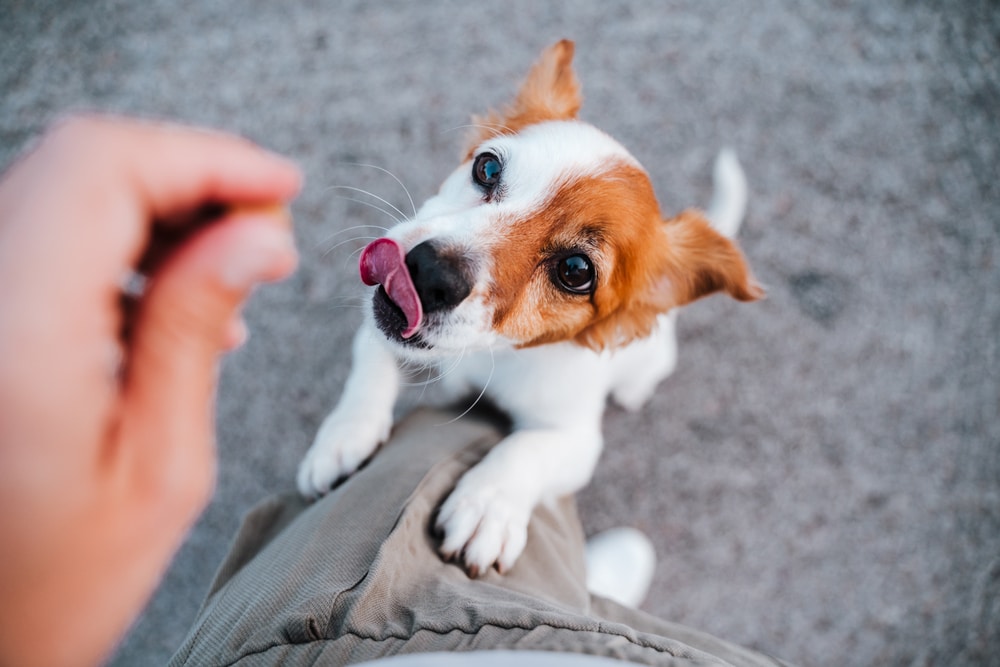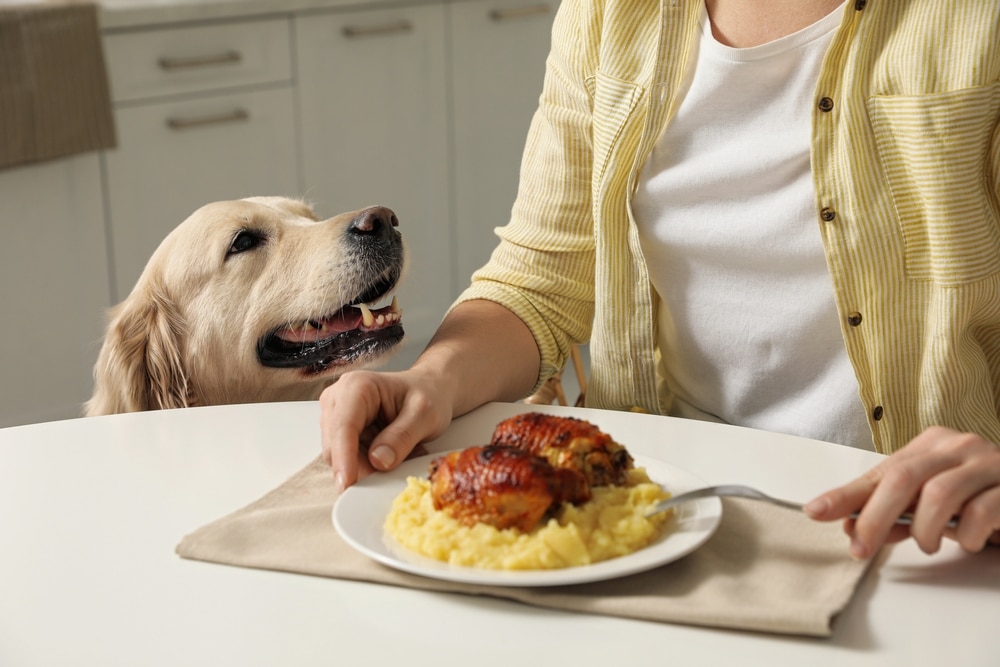Dogs have an uncanny ability to beg persistently, and those sad eyes can be hard to ignore. It could be for a scrap of food or a little extra attention and affection. But why do dogs beg? What drives them to behave this way?
Dogs beg for various reasons, including seeking attention, feeling hunger or thirst, wanting to be closer to their owners, and simply begging out of habit. Begging can also be a sign of boredom or anxiety in some dogs.
Table of Contents
What Is Dog Begging?
Dog begging is the act of a canine pleading and pestering its owner or other people for food, attention, toys, etc. Begging may involve:
- Pawing
- Whining
- Jumping up on furniture or people
- Barking incessantly
- Using their eyes to plead with humans
This behavior can be quite persistent and hard to ignore. While it is natural for dogs to beg for food and other forms of attention, it can be annoying or disruptive if allowed unchecked.
8 Reasons Why Dogs Beg

Dogs most commonly beg because they are seeking something from you. This could be food, attention, toys, affection, etc. Knowing why your dog is begging can help you develop strategies to either redirect the behavior or reduce its frequency. Here are some of the most common reasons dogs beg.
Seeking Attention
Dogs may beg for attention to fill a void. They may be seeking cuddles and belly rubs or just the feeling of being wanted to be loved and appreciated. If your dog only begs when you are around, it may indicate they want more quality time with you.
Feeling Hungry Or Thirsty
Dogs can intuitively sniff food and water when hungry or thirsty. If your dog is constantly begging for food, it may need sustenance. Ensure it gets enough meals throughout the day, and access to fresh water is always available.
Boredom
Begging can also be a sign of boredom in some cases. If your dog is spending too much time alone and not getting enough mental or physical stimulation, it may begin to beg excessively to occupy its time. Ensure your dog has plenty of toys and other activities to engage it mentally and physically.
Seeking Comfort Or Affection
Dogs may beg for physical contact to feel connected to their owners and secure about their environment. This type of begging often manifests as:
- Pawing
- Nudging
- Licking and other actions designed to get your attention
If you can scratch your puppy’s ears or hug it when feeling anxious, it can help your pup feel more secure.
Exploring Their Environment
Dogs are naturally curious creatures who might be begging to explore their environment. Begging is often used to access otherwise inaccessible objects or spaces, such as the dinner table or a forbidden room.
Find your pup begging to get into off-limit areas. Providing the type of enrichment activity or toy that will keep its attention and satisfy its curiosity may be beneficial.
Copying Other Dogs In The Household
If your dog lives with multiple other canine companions, it may start to mimic each other’s behavior. This includes begging for food, attention, or access to different areas of the house. Suppose you have multiple dogs in your home, one of which is a frequent beggar.
In that case, it’s important to address this behavior with all of the dogs to prevent any potential copycatting from occurring.
Being Rewarded In The Past For Begging
If a dog has been rewarded or praised for this behavior, it can become a habit, and it may not understand why you are no longer responding positively. This is especially likely to be true if your dog was previously rewarded with food or treats when begging. It is important to be consistent with your positive behavior.
Force Of Routine
This is a common cause of begging in dogs, especially among the elderly. They can form routines where they beg when certain triggers occur, such as when you’re having dinner or getting ready for bed. This habit can be hard to break if your pup successfully gets what it wants through its begging.
How To Stop Your Dog From Begging
Once you’ve figured out what’s causing your dog to beg, use gentle but firm methods to reduce this behavior. Showing your pup love and understanding will help it feel more secure and create a stronger bond between you two. Take the time to learn why your dog behaves in certain ways and address it with kindness.
Provide Adequate Exercise And Mental Stimulation
Making sure your dog gets enough exercise and mental stimulation can be essential to reduce begging behavior. Do the following:
- Take on regular walks
- Play fetch or fetch-like games
- Hide treats around the house to give your dog something to find
- Rotate the toys often
These activities can help keep your dog occupied and reduce the urge to beg.
Don’t Reward Begging Behavior
Avoid rewarding begging behavior. If your dog begs for attention, wait until it’s seated or lying down, then give it attention. For food, don’t feed your dog until it’s calm; offer a treat then. Don’t encourage this behavior, as it will only be reinforced.
Change Your Routine
Changing your daily routine can also help reduce dog begging behavior. If your dog begs whenever you sit down for dinner, try eating at different times or in a different room. If your dog begs for attention while watching TV, try playing with it before you sit down or handle another spot on the couch.
Feeding Strategies That Reduce Boredom And Anxiety
To help reduce boredom and anxiety, consider providing your dog with food puzzles or slow feeders. These feeders engage your pup in a mentally stimulating challenge and can provide it with hours of mental stimulation.
Additionally, divide the meals into smaller portions throughout the day. This helps to satisfy your pup’s hunger while avoiding excessive begging.
Alternatives For Begging Behavior
To replace the act of begging, train your dog to do an alternative behavior like sitting or going to bed than pawing at you. Rewarding it with a treat when it follows this command will help reinforce the behavior and help it to understand that this is the desired response.
Seek Professional Help When Necessary
If your dog’s begging is due to anxiety or boredom, seek professional help from a veterinarian or veterinary behaviorist. These experts can diagnose the root of your pup’s problem and suggest how to best deal with the behavior.
They may also recommend medications or supplements to help reduce your pup’s stress and anxiety levels. They may suggest additional training strategies to help ease your pup’s behaviors.
In Conclusion: Why Do Dogs Beg?
Begging is a sign that your pet needs more care and attention. It’s important to understand the root cause of this behavior and work on developing healthier habits. Providing your pup with love, toys, or activities to keep it entertained are all ways you can help reduce begging frequency. So, take the time to show your furry friend how much you care. It’ll thank you for it!
So, is your dog begging a lot lately? Or are you just wanting to understand dog behavior better? Let us know in the comments below!
